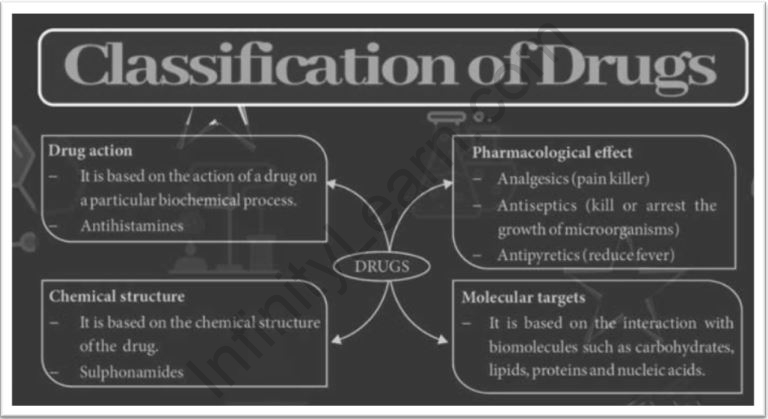Table of Contents
In the field of medicine, chemistry has made a considerable contribution. Medicines are made with chemicals. New drugs are developed by chemical analysis and the creation of novel molecules. Medicinal chemistry is a discipline of chemistry that deals with the creation, design, and synthesis of pharmaceuticals. Medicine or meds are chemical compounds that aid in the management of infections or the alleviation of suffering in living organisms. Chemotherapy is the treatment of illness with medicines or chemical compounds that kill bacteria without harming our bodies. Chemotherapeutic agents are the substances used in this method.
A Brief Outline
Medicines are made up of a vast number of different components. Drugs are low-molecular-mass chemical compounds that act with macromolecular sites and produce appropriate biological effects. Medicine is defined as the use of pharmaceuticals in the recommended method to treat, prevent, or diagnose a disease or ailment. However, if ingested in higher dosages than those recommended, it can become hazardous. The phrase ‘chemotherapy’ refers to the use of chemicals for therapeutic purposes. Our understanding of medicinal chemistry is constantly expanding, leading to new discoveries in this field. Medicines are classified into distinct classes based on their impact on biological systems: antacids, antihistamines, analgesics, antiseptics, and so on.
Important concepts of Medicinal Chemistry
Chemicals used in medicine
Medicines are categorized into different classes based on their chemical composition, biological reactions, and pharmacological effects. Let us try to understand Medicinal chemistry in detail below by looking at some of the popular chemicals used in the medicines.
-
Antacid chemical
Hydrochloric acid is found in our stomach and aids digestion as well as fighting stomach infections. However, as the acid level rises, we experience nausea, stomach aches, and, in severe cases, gastric ulcers. Antiacids are required to treat this condition. Antacids are chemical substances that neutralize the presence of excess acids in the stomach as gastric fluids and provide relief from acid reflux.
-
Antihistamines
Antihistamines treat the majority of allergy symptoms and illnesses. People who are allergic to pollen and other allergens are the most likely to utilize them. Cetirizine, brompheniramine (Dimetapp), and other antihistamines are commonly used.
-
Tranquillizers
Tranquilizers have a soothing impact and help patients feel relaxed and tranquil by relieving both the physical and psychological consequences of anxiety, tension, and other similar conditions. Because they are a component of sleeping pills, the medications are only suggested for short and medium-term use. They measure the noradrenaline (neurotransmitter) level, which is linked to mood swings. If the person’s noradrenaline level is low, he or she is depressed. Antidepressant medications are required to treat such issues. Pentobarbital, Xanax, and Limbitrol are among tranquillizers.
-
Antimicrobial
Antimicrobials are a class of drugs that inhibit the growth of pathogenic microorganisms such as bacteria, fungi, and viruses. Antibiotics, for example, are used to treat bacteria, antivirals are used to treat viruses, and antifungals are used to treat fungi.
-
Antibiotics
Antibiotics are used to treat bacterial infections because they are less hazardous to people and animals. Antibiotics are now defined as a drug manufactured entirely or partially by chemical synthesis that suppresses or kills microorganisms.
Formaldehyde uses in medicine
- Formaldehyde is a chemical that is used to make hundreds of products that help people live better lives. Formaldehyde is found in very little, if any, of the end items that customers use.
- The use of formaldehyde in the production of vaccinations, anti-infective medications, and hard-gel capsules has a long history of safety. Formaldehyde, for example, is used to inactivate viruses so that they do not cause disease, such as the influenza virus in the flu vaccination.
- Formaldehyde has long been employed in the production of viral and bacterial vaccines in small doses. The complete virus is used in some vaccinations, such as the polio vaccine, to trigger an immune response and protect prevent future infection. Before a vaccination is given to a patient, formaldehyde is being used to inhibit the growth of the virus or bacteria in it. Formaldehyde could also be used to detoxify bacteria in vaccinations, such as the diphtheria vaccine toxin.
- Some vaccines contain formaldehyde as a preservative to inhibit bacterial growth or fungi. The amount of formaldehyde used in vaccines is so little in comparison to the amount found naturally within the body that it poses no risk.
- The chemical compound formaldehyde is made up of hydrogen, oxygen, and carbon. It is commonly used as a stabilizer due to its antibacterial characteristics.

A chemical compound used to treat diseases or relieve pain is known as medicine. Traditional and contemporary remedies are the two types of medicines. Traditional medications are taken from natural resources such as plants and animals, whereas modern medicines are created artificially in the lab. Medicines can cause negative side effects. To avoid any negative side effects, medicines should be taken as directed by a physician.
Crack NEET with Result-Oriented Learning Program from Infinity Learn
FAQs
The majority of chemicals utilized in medicine are organic molecules. Mercury, arsenic, biphenyl-A, phthalates, and other substances may have negative side effects.
Acetic anhydride, acetone, diethyl ether, benzyl chloride, toluene, hydrochloric acid, and so many more organic compounds are among the chemicals utilized in pharmaceuticals.
Chemicals make up the entirety of medicines. As a result, it is solely due to chemistry and its use. For the study of medications, it is critical to have a solid understanding of chemistry. What compounds are found in pharmaceuticals?
What are the substances that are utilized in medicines?
How important is chemistry in medicine?
Infinity Learn App
Now you can find answers to all your subject queries & prepare for your Exams on our Educational App – Infinity Learn.






